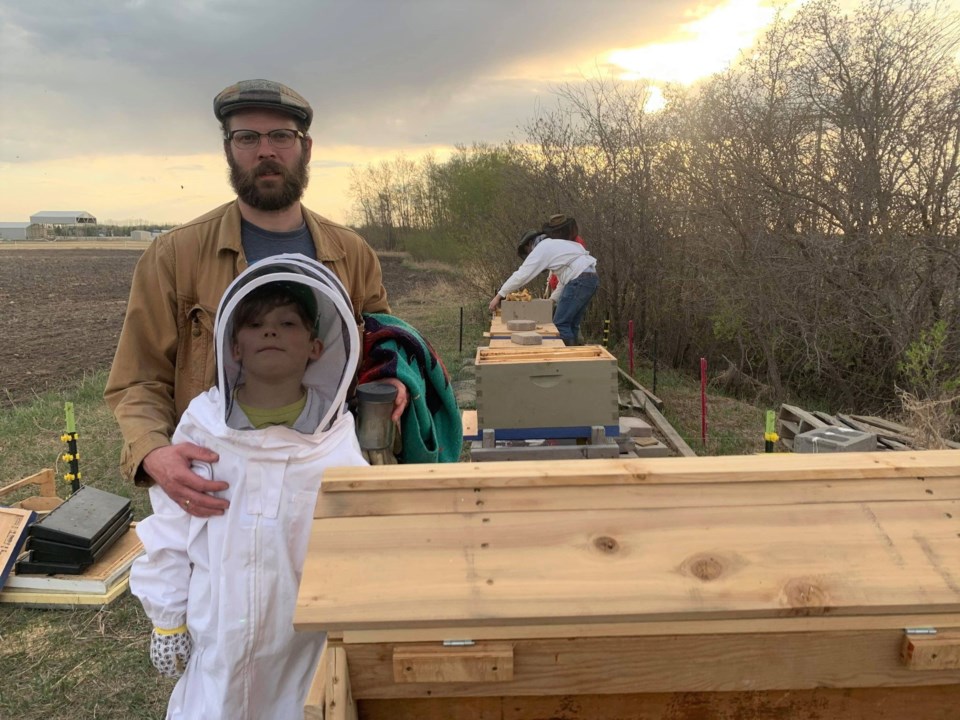A mother, and her son, are hoping to start collecting honey from backyard bees in the city.
Allison Henderson-Hunter, and her eight-year-old son Ewan, appeared before the regular meeting of Yorkton Council Monday to lobby for changes to the city’s Animal Control Bylaw to allow for urban beekeeping on a small scale.
“Bees are cool,” enthused Ewan Hunter, adding that they have been kept for more than 4000 years.
Earlier Ewan told Yorkton This Week he has been interested in bees for some time.
“I like them because they make honey and help plants,” he said.
Henderson-Hunter told Council that honey bees offer a number of benefits, from personal ones such as teaching the keeper and their family about where food comes from, to better pollination of local flowers in the area the bees are kept.
The duo were proposing a pilot project where they would be allowed to keep a single hive and their efforts could be monitored by the City before a permanent allowance for backyard bees was made.
The idea of backyard bees is not a new one, noted Henderson-Hunter, with bees already allowed in Moose Jaw, Regina and Saskatoon. She added the City of Edmonton has very detailed requirements for urban bees, and she recommended Yorkton borrow heavily from what they have done.
Those regulations limit the urban beekeeper to a single hive, with up to six supers (the sections honey is collected in), with the lone hive at least 25 metres from public spaces, and three feet from property lines, or behind a six-foot high fence.
In addition, Henderson-Hunter said new keepers should be required to take a beekeeping course, and be members of a bee club, as well as registered with the Saskatchewan Ministry of Agriculture.
Proof that neighbours have been made aware of the activity was also called for.
“We see this as a sweet win, win,” Henderson-Hunter said, adding they are looking forward to when they can “. . . enjoy the sweet reward of a lot of hard work.”
As it currently stands, the City’s Control Bylaw prohibits urban beekeeping, explained Nicole Baptist, Bylaw and Safety Supervisor with the City Monday.
“Although Administration cannot be fully aware of the reasons that beekeeping was originally prohibited, it can be speculated that because beekeeping is seen as a form of agriculture and the keeping of other agriculture animals such as chickens or goats is prohibited, that it too would be prohibited,” she explained.
“However, it is acknowledged by Administration that there are many differences between keeping chickens and keeping bees; and by properly looking into this, it may be possible to successfully permit urban hobby beekeeping."
It’s important to clarify that this report is only addressing hobby urban beekeeping on personal residential properties, as beekeeping for business purposes would need to be looked into much further from the planning perspective and business licence perspective, added Baptist.
Obviously urban beekeeping has worked in other cities.
“Administration has researched how other communities in the province handle urban beekeeping and identified that most communities do not prohibit or regulate urban beekeeping,” noted Baptist. “Bylaws are often a means of restricting actions that are detrimental to the function of a community and are also a way of managing a City’s liability. Some communities that are choosing not to regulate beekeeping may be handling it that way because they have not had any issues along the way or they may not have the resources to appropriately manage it.
“A handful of communities such as Warman, Saskatoon, Prince Albert, Moose Jaw and Martensville permit bees with a varying degree of requirements or parameters established in the Bylaws or policies.”
Still there were concerns.
“From Administration’s perspective, the two biggest concerns with urban beekeeping is swarming, when the queen leaves the hive to find a new home and bees becoming overly aggressive and territorial of their hive,” offered Baptist. “Should Council wish to move forward with the proposed pilot project, Administration will have the presenter sign a Letter of Understanding (LOU) to address the above noted concerns and ensure that the proposed guidelines are followed. The draft LOU includes the proposed guidelines that the presenter suggested, as well as a statement that should the bees become aggressive or a nuisance in the community, they will be removed in the stated amount of time.”
With a pilot project the local impact could be better determined, offered Baptist.
“At the end of the beekeeping season, if it is determined that the pilot project was successful and Administration intended to move forward with recommending changes to the Animal Control Bylaw to permit urban beekeeping, Administration would seek feedback from Protective Services Committee and any other committee desired by Council prior to bringing the Bylaw forward to City Council,” she said.
Council was quickly on side with the bees.
“I think that it’s a great idea ... a great thing to start in the city,” offered Councillor Dustin Brears.
Coun. Randy Goulden said she liked that the bees help with pollination.
The issue even had Mayor Mitch Hippsley quoting Albert Einstein, who had noted decades ago “once bees start disappearing society starts disappearing.”
The pilot project was unanimously supported by Council, and even expanded to allow for a limited number of other beekeepers to take part by contacting the City.




